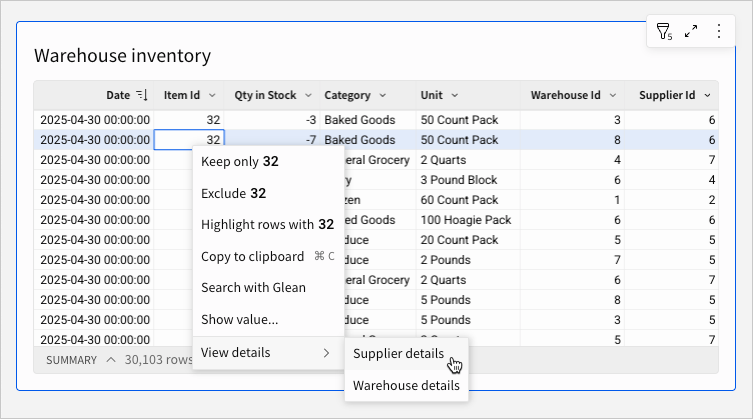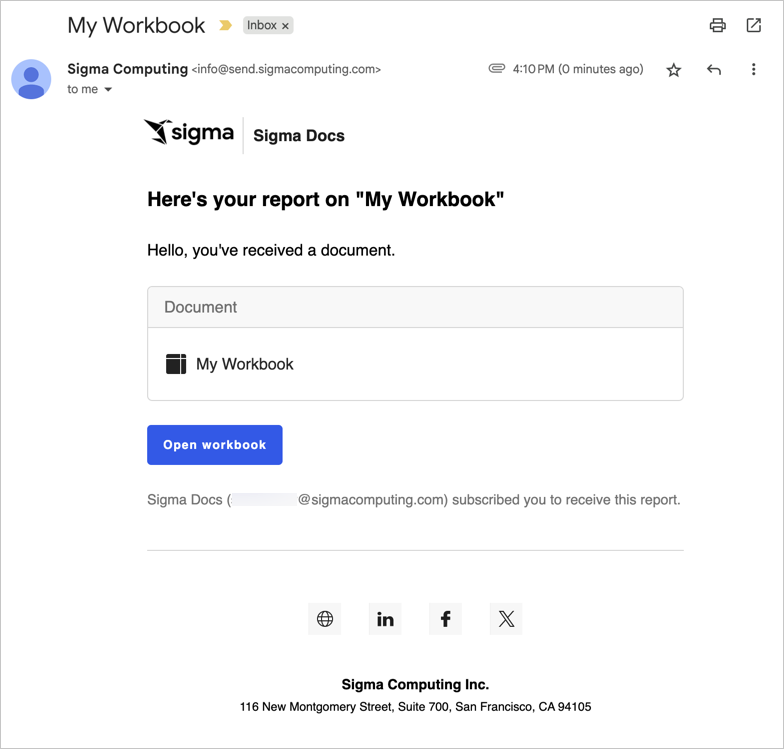What's new in Sigma
Admin
Restrict access to copying data
If you want to restrict the ability of Sigma users to copy more than one cell of data at a time, a user assigned the Admin account type can turn off the Bulk copy from tables toggle for your organization.
By default, the toggle is turned on, maintaining the existing behavior of allowing users to copy multiple cells from tables, pivot tables, input tables, and the underlying data of a chart.
API
New output included in the List team members endpoint
The List team members (GET /v2/teams/{teamId}/members) endpoint includes a new addedBy option in the response that provides the user ID of the person that added a user to a team.
New options to swap data model sources for the Tag a workbook endpoint
The Tag a workbook (POST /v2/workbooks/tag) endpoint includes a new option to swap from or to a data model, including a tagged version of a data model. Similar to the UI, you can only swap a data model source to another version of the same data model.
Data apps
Call stored procedures with actions (GA)
Call stored procedures defined in a Snowflake, BigQuery, or Amazon Redshift connection using an action. If the stored procedure returns non-tabular results like a string, number, or Boolean value, you can work with the output as an action variable and display the values in dynamic text or a control element.
With this release, when you swap the source of a workbook, the source of the stored procedure action can also be swapped.
For example, if you have an existing stored procedure to calculate project timelines based on several variables, you can set up a data app with input control elements to collect the variables, pass them as arguments to a stored procedure action that calls the stored procedure, then display the results in a control element and store them in an input table in Sigma.
For more details, including detailed end-to-end examples, see Create actions that call stored procedures.
Custom context menu actions (GA)
Add custom context menu items in tables, pivot tables, input tables, and charts to provide clear, discoverable triggers for actions relevant to selected cells and data points. You can add standalone menu items or create nested submenus that execute any action effect, including calling stored procedures, generating iframe events, and opening modals.

For more information, see Create custom context menu actions.
App notification actions public beta coming soon
Over the next week, Sigma will roll out app notification actions to public beta for all customers. Use app notification actions to notify users and channels via email and Slack independent of an export or download. See Create actions that send notifications and export data.
The Notify and export action replaces the existing Download and export action. Existing Download and export actions will be migrated without changes to functionality.
Data modeling
New tutorial content: Intro to data models
A new tutorial covering the basics of creating a data model and preparing it for use as a data source in downstream analyses is now available. See Tutorial: Intro to data modeling to follow along and learn to create a data model with step-by-step instructions.
Filters and controls
Additional options and new default handling for null values in filters and controls
When filtering data with null values using a data element filter or a control element, you now have three options to handle null values:
- Always, to always include null values, regardless of whether a filter value is set. Equivalent to the previous functionality where Include nulls is selected.
- Never, to never include null values, regardless of whether a filter value is set. Equivalent to the previous functionality where Include nulls is deselected.
- When no value is selected, to include null values only if the filter or control has no selected value.
The When no value is selected option is the new default for filters and controls created after Thursday, August 7th. Existing filters or controls are unaffected by this change.
Functions and calculations
SplitToArray function
The SplitToArray function splits a specified string by a given delimiter and returns an array of substrings. For more information, see SplitToArray.
New video tutorial series: Getting started with functions and groupings in Sigma
A new series of video tutorial content is now available covering the basics of grouping data in Sigma and performing calculations with grouped data using aggregate and window functions. See Create and manage tables to view the first video in the series or go to the Sigma training videos page to watch the entire five-part series.
Workbook elements
Popovers (GA)
Use popovers to display information in containers anchored to specific button elements. Popovers allow you to present relevant content (tables, charts, controls, etc.) only when needed, creating a more efficient and simplified workbook interface.
For more information, see Use popovers to simplify a workbook interface.
Workbook features
Email template changes
The default email templates used for scheduled exports, invitations to join an organization, and more now have an updated design. Custom email branding still applies to the default email templates.
In response to customer feedback, the updated email template for scheduled exports now correctly references the schedule creator instead of the workbook owner.

Conditional exports no longer list the condition in the email message
Any export scheduled to send an email when a condition is met no longer lists the condition in the email message.
If you still want to include the condition in the export, update the message included in the scheduled export to include the condition. For more details about scheduling a conditional export, see Schedule a conditional export or alert.
Updated workbook URL format
In workbook URLs, the :explore and :bookmark parameters have been renamed to :customView and :savedView, respectively. This update aligns the UI redesign that introduced custom views and saved views in place of explore capabilities and bookmarks.
URLs for existing workbooks have been automatically reformatted, and navigating to a previous URL that uses :explore or :bookmark parameters will redirect to a current URL that uses :customView and :savedView. This change does not apply to embed events or public APIs.
